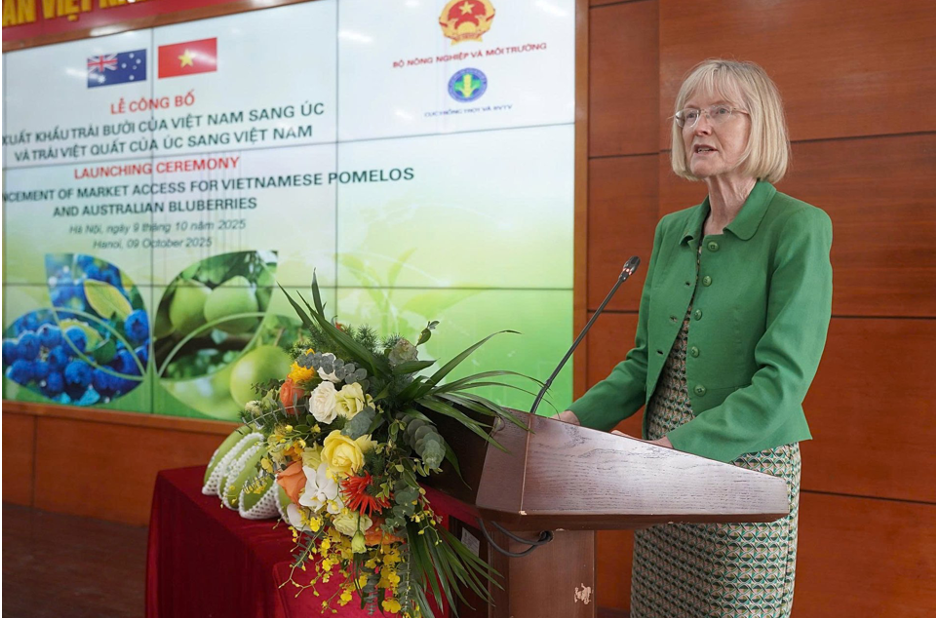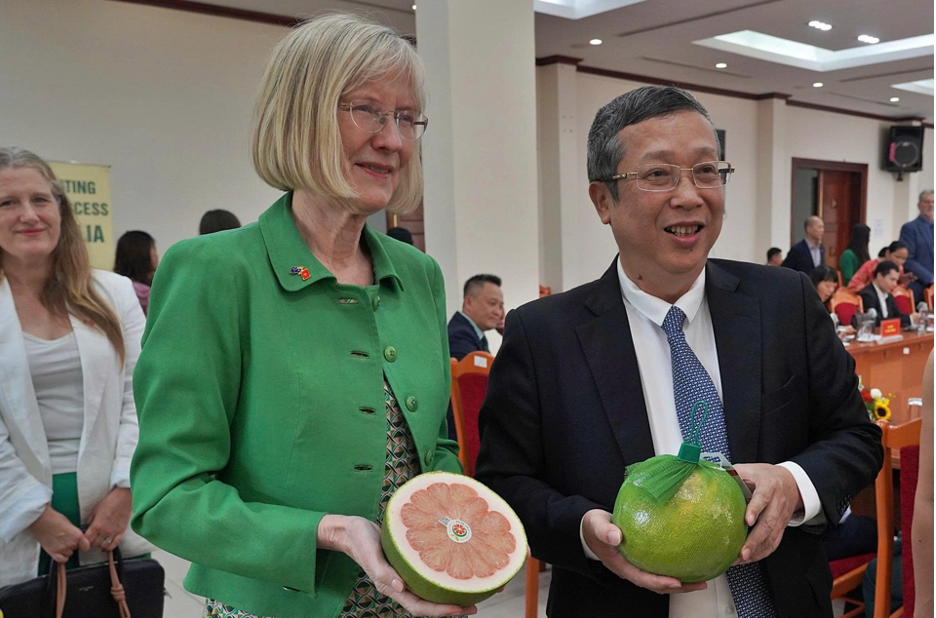On the morning of October 9 in Hanoi, the Ministry of Agriculture and Environment, in collaboration with the Australian Embassy, held a ceremony to announce the export of Vietnamese pomelos to Australia and the import of Australian blueberries to Viet Nam.
A special milestone in agricultural cooperation between the two nations
Speaking at the ceremony, Deputy Minister Hoang Trung emphasized that the bilateral trade of the two fruits not only carries commercial significance but also reflects mutual trust, understanding, and a shared commitment toward sustainable development. This marks a special milestone in the agricultural cooperation between the two countries.
“From orchards to quarantine facilities, experts from both nations have worked together for three years to achieve today’s result,” Deputy Minister Hoang Trung noted, adding that this success demonstrates the spirit of technical and policy cooperation between the two Ministries of Agriculture.
Pomelo, the eighth Vietnamese fruit officially approved for export to Australia, is seen as a symbol of integration. Viet Nam currently has more than 110,000 hectares of pomelo plantations, producing about 1.2 million tons per year, mainly concentrated in the Mekong Delta, the Red River Delta, and the Northern Midland and Mountainous regions.
From Da Xanh and Nam Roi to Phuc Trach, Dien, Doan Hung, and Tan Trieu, each pomelo variety carries its own regional characteristics, contributing to the reputation of “Vietnamese pomelo” on the global fruit map. In recent years, many pomelo-growing areas and packing facilities have achieved VietGAP and GlobalGAP certification. The processes of irradiation, pest treatment, and traceability are also strictly implemented to enhance quality and ensure competitiveness.
 Australian Ambassador to Vietnam Gillian Bird stated that the signing of today’s protocol opens up major opportunities for fruit and vegetable trade cooperation between Vietnam and Australia.
Australian Ambassador to Vietnam Gillian Bird stated that the signing of today’s protocol opens up major opportunities for fruit and vegetable trade cooperation between Vietnam and Australia.Along with Australia’s approval of Vietnamese pomelo imports, Viet Nam has also allowed the import of Australian blueberries - the seventh Australian fruit permitted to enter the Vietnamese market.
Deputy Minister Hoang Trung remarked that Australian blueberries are of premium quality, rich in nutrients, and produced under clean ecological conditions that strictly comply with biosecurity standards. Their presence in Viet Nam not only diversifies the domestic fruit market but also reflects mutual trust in quarantine management and food safety between the two competent authorities.
Deputy Minister Hoang Trung called on localities, enterprises, and industry associations to continue strictly complying with Australia’s import requirements, especially in production processes, traceability, and pest control. At the same time, Vietnamese technical agencies must swiftly complete the necessary procedures to ensure that the import of Australian blueberries proceeds smoothly, transparently, and sustainably.
He expressed his confidence, saying: “With Vietnamese pomelos and Australian blueberries, we are opening a new chapter in sustainable agricultural cooperation and shared growth between our two nations.”
Mr. Huynh Tan Dat, Director General of the Plant Production and Protection Department, noted that the official approval for fresh Vietnamese pomelos to enter Australia - one of the world’s most stringent markets - demonstrates the growing capacity of Viet Nam’s plant quarantine system. At the same time, Australia’s approval to export blueberries to Viet Nam creates opportunities for domestic consumers to access high-quality agricultural products, contributing to a balanced bilateral trade relationship.
 Deputy Minister of Agriculture and Environment Hoang Trung and Australian Ambassador Gillian Bird with pomelos meeting export standards.
Deputy Minister of Agriculture and Environment Hoang Trung and Australian Ambassador Gillian Bird with pomelos meeting export standards.Great opportunities for Viet Nam - Australia fruit and vegetable trade cooperation
Speaking at the ceremony, Australian Ambassador to Viet Nam Gillian Bird expressed her delight in attending the event announcing the market opening for Vietnamese pomelos to Australia and Australian blueberries to Viet Nam - an important milestone in the agricultural partnership between the two countries.
According to Ambassador Bird, agriculture is one of the key pillars of bilateral cooperation. Both nations share the goal of developing a sustainable, profitable, and climate-resilient agricultural sector. In 2024, two-way trade in agriculture and food reached 4.4 billion AUD, reflecting the deepening economic ties between Viet Nam and Australia. Australia currently supplies Viet Nam with high-quality products such as cotton, wheat, red meat, dairy, and fresh produce, while demand in Australia for Vietnamese agricultural goods, including seafood, coffee, rice, and fruit, continues to rise.
The signing of today’s protocol marks a major opportunity to strengthen fruit and vegetable trade cooperation between Viet Nam and Australia. “I’m delighted that Vietnamese consumers will soon enjoy Australian blueberries - grown in diverse soils and climates, offering excellent flavor, high nutritional value, and meeting the strictest standards of safety and sustainability,” Ambassador Bird shared. Given the relatively short distance, Australian blueberries can reach the Vietnamese market within just 24 hours after harvest.
Conversely, the Ambassador expressed her hope to soon taste Vietnamese pomelos in Australia. She commended the strong collaboration between the Australian Department of Agriculture, Fisheries and Forestry and Viet Nam’s Ministry of Agriculture and Environment, particularly the Plant Production and Protection Department, in implementing the “2+2” cooperation mechanism, which allows both sides to open their markets simultaneously for two priority products. The Ambassador expressed confidence that this mechanism will continue to yield new achievements, further promoting agricultural trade and deepening the strategic partnership between the two countries.
Vietnamese pomelos expand their journey to conquer demanding markets
Ms. Le Thi Thanh Thao (pictured), Country Representative of the United Nations Industrial Development Organization (UNIDO), affirmed that the export of Vietnam’s first pomelo shipment to Australia marks a new milestone for the country’s agriculture sector in general and the fruit industry in particular.
According to the UNIDO representative, this success builds upon the experience gained from opening the U.S. market to Vietnamese pomelos - a process in which UNIDO provided technical and post-harvest support. The valuable lessons learned have enabled Vietnam to fully meet the strict technical standards and requirements set by the Australian market.
Through the Global Quality and Standards Programme (GQSP Vietnam), funded by the Swiss Government (SECO) and implemented by UNIDO, close support has been provided to Vietnam’s tropical fruit sector, including Da Xanh and Nam Roi pomelos, to help the country meet the stringent requirements of demanding markets such as the U.S., the EU, and now Australia.
The program has assisted in developing and training for the application of 18 Standard Operating Procedures (SOPs) for four key fruit types, including pomelo; enhanced technical capacity for cooperatives, packing facilities, and technical officers on good practices, pesticide residue control, and post-harvest handling; and developed traceability systems, field and packing house logbooks, enabling the management of nearly 10,000 planting area codes and 1,800 packing facility codes. These efforts have contributed to ensuring transparency throughout the entire supply chain.
UNIDO also offered several recommendations to further promote Vietnamese fruit exports to the Australian market. According to Ms. Thao, Vietnam needs to improve and expand its traceability system as well as the management of planting area and packing facility codes.
She emphasized that strengthening technical capacity, quality infrastructure (testing and certification), and post-harvest preservation technology is essential. Beyond this initial step of market access, Ms. Thao highlighted the importance of developing a national brand for Vietnamese pomelo, including organizing promotional campaigns and guiding consumer awareness in new markets.
Over the past two years, Vietnam and Australia have worked closely to advance technical exchanges, complete the pest risk analysis report, and reach an agreement allowing the import of fresh Vietnamese pomelo into Australia. This makes pomelo the sixth Vietnamese fruit officially granted market access to Australia, following dragon fruit, lychee, longan, mango, and passion fruit.